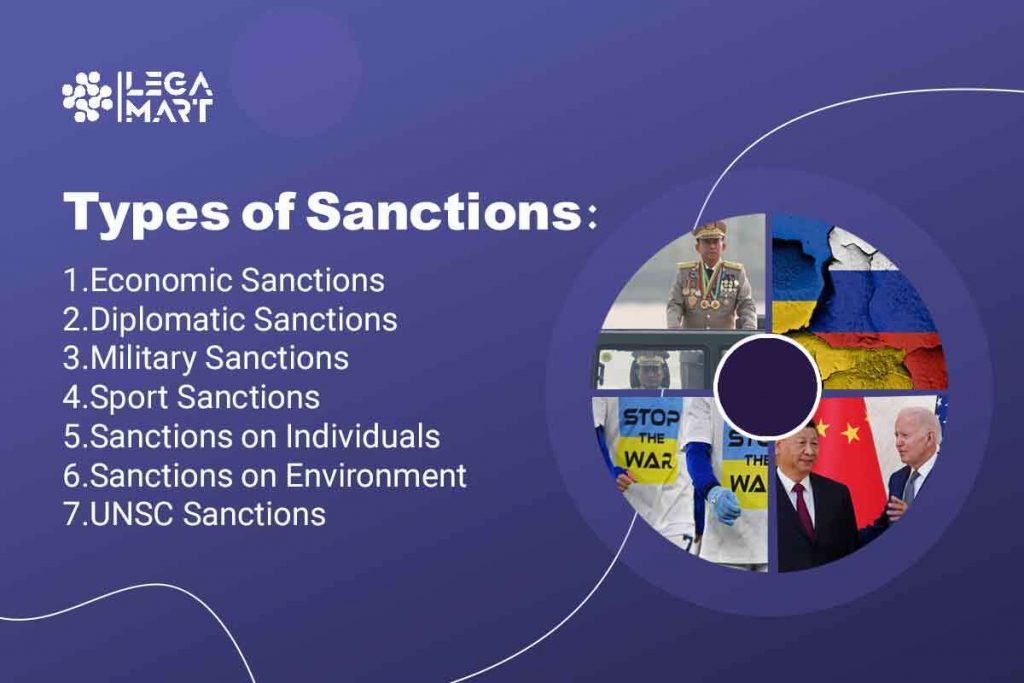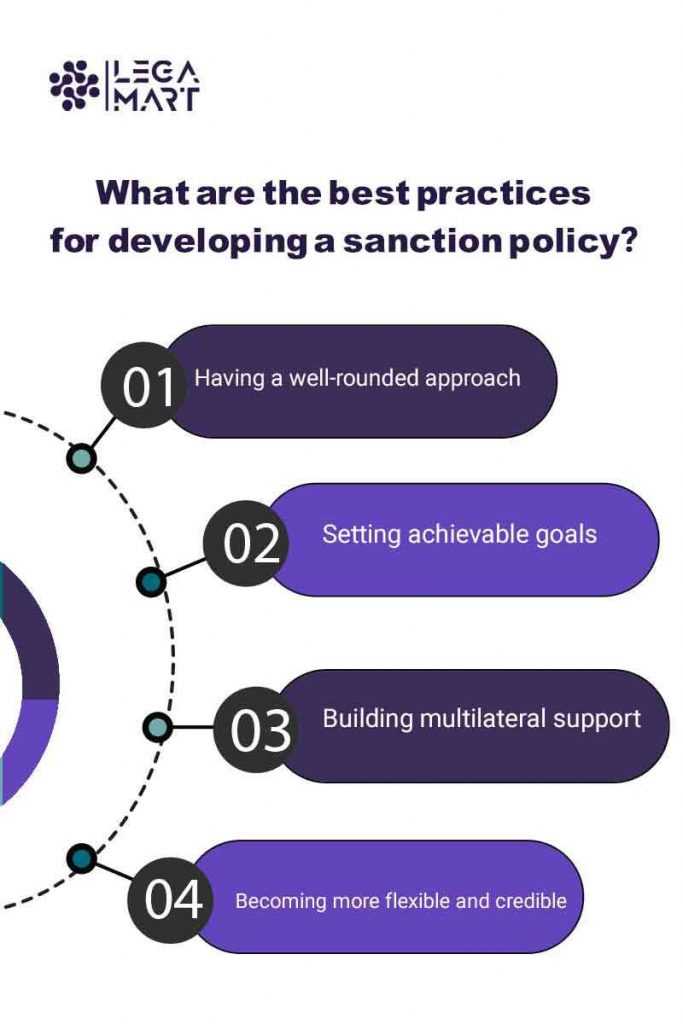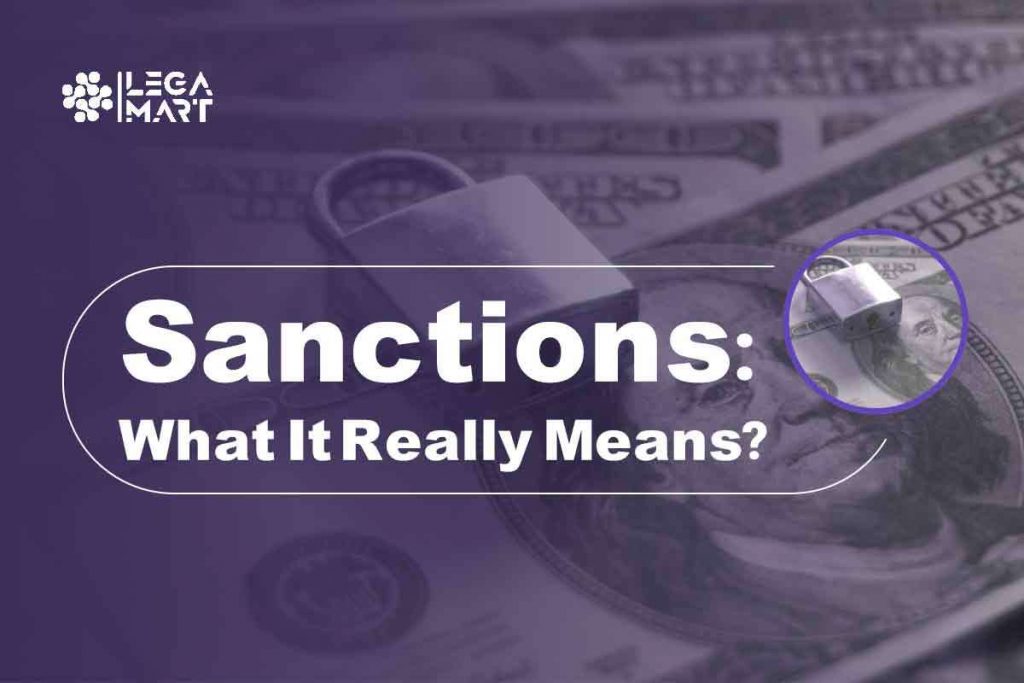Introduction
The term ‘sanctions’ have been heard by many across the globe, especially in the news these days. However, what does it mean, and how are they imposed? Oxford Bibliographies defines them as “deliberate, government-inspired withdrawal or threat of withdrawal of customary trade or financial relations.” Economically related sanction include different forms of financial transaction restrictions, tariffs, and trade barriers.
Economic restrictions have various political, diplomatic, and even national security implications. Under Article 41 of the United Nations Charter, sanction measures include a broad range of enforcement options that do not involve using armed force. In theory, these restrictions are intended and imposed to settle peace globally; however, in practice, it is mixed with the political issues of some countries that may have with each other!
Under the limitations of the Security Council, there are comprehensive economic and trade prohibitions that include more targeted measures such as arms embargoes, travel bans, and financial or commodity restrictions. On the one hand, the EU limitations normally restrict economic relations between the European Union and the targeted country that is undergoing those specific restrictions. On the other hand, the stated prohibitions may entail asset freezes and visa bans for certain individuals.
For getting to know more about sanctions effect on the economy, read:
FATF Black & Grey: Best Way of Investment Measurement
UK Sanctions Regimes
Sanctions regimes are sets of measures established for specific purposes. These can focus on a particular issue (thematic) or a specific country or region (geographic).
The existing UK sanctions regimes are enforced through various laws, including the Sanctions and Anti-Money Laundering Act 2018 (SAMLA), the Sanctions Act, and other legislation like the Export Control Order 2008 and the Anti-Terrorism, Crime and Security Act 2001.
SAMLA grants certain UK government ministers the authority to create sanctions regulations and designations. These sanctions can be categorized based on geography (e.g., Afghanistan, Republic of Belarus, Syria, Russia, or Iran) or theme (e.g., global anti-corruption, chemical weapons, global human rights, or counter-terrorism).
Government agencies that administer or enforce the sanctions regime
Several government departments and agencies in the UK play roles in managing and enforcing sanctions, including:
- The Office of Financial Sanctions Implementation (OFSI) enforces financial sanctions for HM Treasury and investigates and imposes penalties for violations of financial sanctions.
- The Office of Communications (OFCOM) ensures compliance with and enforces trade sanctions related to Internet services.
- The Department for Business and Trade (DBT), through the Export Control Joint Unit (ECJU) and the Import Licensing Branch (ILB), handles trade sanctions and embargoes. HM Revenue and Customs (HMRC) investigates and enforces breaches of trade sanctions using criminal enforcement powers.
- UK Border Force (UKBF) enforces import and export sanctions at the UK border.
- The Home Office is responsible for implementing travel bans.
- The Foreign, Commonwealth & Development Office (FCDO) shapes sanctions policy and engages in international sanctions negotiations.
- The Department for Transport implements transport sanctions, including those concerning aircraft and shipping.
- Law enforcement agencies like the National Crime Agency (NCA), Serious Fraud Office (SFO), and Crown Prosecution Service (CPS) have the authority to investigate and prosecute criminal breaches of financial sanctions.
Types of Sanction

There can be various types of sanctions imposed. They are:
- Economic Sanctions. These are financial or commercial penalties imposed to ban any financial or trade relationships between countries. The same may be achieved by levying more import duties on the sanctioned country’s goods, restricting the export of goods to the sanctioned country, or blocking the sanctioned country’s ports.
- Diplomatic Sanctions. These are more political and are used to express displeasure, disapproval, or disappointment in certain actions. These include reducing or removing diplomatic ties, including cancelling important high-level government visits or meetings or eliminating embassies of the sanctioned country.
- Military Sanctions. These are mostly used in extraordinary circumstances wherein the country involves their armed forces. The actions might differ in intensity, from arms embargo to targeted military strikes.
- Sport Sanctions. These sanctions restrict a country’s athlete from participating or performing in international competitions and tournaments. The main aim of these types of sanctions is to hurt the morale of the country and bring the country to the world’s attention.
- Sanctions on Individuals. It is possible for the UNSC (United Nations Security Council) to sanction specific individuals or political leaders, which may include the freezing of assets or imposing travel bans.
- Sanctions on Environment. These sanctions are fairly new. However, they have achieved great support due to the rising environmental crisis. These sanctions are mainly applied to endangered species, ozone-depleted chemicals, and environmental laws.
- UNSC Sanctions. Along with the application of the above-mentioned sanctions, some sanctions are specifically applied by UNSC to achieve the following objectives:
- Maintain, support, and restore international peace and security.
- Stop non-constitutional changes.
- Obstruct Terrorism
- Human Rights protection
- Non-proliferation promotion
Different Processes for Imposing Sanctions
There are different processes for imposing sanctions today from the UN, US, and EU. The Security Council’s global threat response mechanism is to cut economic ties with both state and non-state groups.
The European Union imposes limitations (known more commonly in the twenty-eight-member bloc as restrictive measures) as a major part of its Common Foreign and Security Policy (CFSP).
The Treasury Department’s Office of Foreign Assets Control (OFAC) administers more than two dozen existing US restrictions programs.
Another classification of the above-defined restrictions is based on the number of parties imposing sanctions. This includes unilateral and multilateral sanctions. Unilateral sanctions are riskier, as only one country is on the line for the sanction’s results.
Import sanctions usually take on an immediate effect: the inability to export goods abroad or have a foreign nation purchase them. This could be crucial if the sanctioned country’s economy depends on exported goods.
Financial Sanctions and Banking
This classification of sanctions is intended to punish misconduct by a supervised bank. They serve as a deterrent to the bank concerned and the whole banking body of a country. Imposing sanctions can be initiated during ongoing breaches and after the breach has ceased, as long as the limitation period is respected.
You should note that every organization which imposes sanction may have its regulations. For example, in the European Union, in the event of breaches of regulations implementing EU directives, breaches committed by natural persons, or when a non-pecuniary penalty has to be imposed, the ECB (European Central Bank) may request the relevant national supervisory authority, which is called NCA (National Competent Authorities) to open the appropriate proceedings. The NCA conducts these proceedings and decides on the resulting penalties.
Other Sanction Classifications
There are other classifications of this specific type of limitation. Secondary sanction focus on third parties stopping their activities with the sanctioned country by threatening to cut off the third party’s access to that sanctioned country. This is present in the recent US, EU, and UK sanctions against Russia after the Russia-Ukraine conflict. Upon much research, it is believed that secondary sanctions are the worst economic restrictions, including the burden of economic hardship and restrictions upon the nation’s citizens and industries.
If you as a citizen considering to immigrate due to sanctions then you must go through the immigration requirements in countries like Norway to plan your international move which are immigrant as well as budget friendly.
It is worth mentioning that when establishing a business in a jurisdiction, compliance with applicable national and international law regarding these limitations is a really important stage that should be closely considered. If a sanctioned nation decides to be non-compliant or attempts to circumvent the sanctions, a financial penalty will be issued and might be regarded as a criminal act. Therefore, as we continue to examine prohibitions, we must perform case studies on targeted countries and the sanctions imposed upon them.
Do Sanctions work?
The successful working of the sanctions has been a contentious topic of discussion over the years. It is believed that targeted sanctions are effective, and hence, they should be a part of the toolkit of foreign policy-makers. However, some evaluations should be kept into consideration for sanctions:
- The dynamics of each case are different. The successful applicability of sanctions varies from case to case. This is why it is not necessary for sanctions to work in every scenario. More often than not, sanctions with more political ambitions are less likely to function than those with limited objectives. It is further possible that sanctions end up achieving the desired economic effect without any change in the behaviour of the country. A great example was the UN sanction on Afghanistan, which were imposed in 2000 and 2001. Even though the applicability of the sanctions was a major financial setback for the country, it still failed to move the Taliban regime enough to surrender Osama Bin Laden.
- The applicability of the sanctions evolves with time. The US sanctions on Iran have been a great example of this. While 1980 saw the removal of these sanctions for a brief period, overall, since 1979, Washington has imposed sanctions on Tehran. However, looking at the situation of the sanctions now, there has been a tremendous change in their logic and applicability.
- Irrespective of whether the they have achieved their objective, in the end, it is the comparative utility of the sanctions which is important. Even though the US and EU sanction against Russia could not end the Russia-Ukraine conflict, it cannot be denied that the lack of any sanctions on Russia could worsen the situation further. After all, in some cases, sanctions are simply used as an expression of criticism.
Licenses that would authorize activities otherwise prohibited by sanctions
Licenses may be available under sanctions regulations to authorize activities that would otherwise violate the sanctions; for example, when an individual or organization is subjected to an asset freeze, freezing their funds or economic resources is mandatory. Dealing with these assets or making them available to a designated person is prohibited unless there is a legislative exception or a valid license.
General and Specific Licenses
General and specific licenses can apply for a defined or indefinite duration.
Specific License
Specific licenses are granted to individuals or entities applying for a license related to a specific activity. When issued, a specific license may come with conditions and reporting requirements.
For financial sanctions, a specific license can only be granted if one of the licensing grounds specified in the relevant sanctions regulations is applicable and the criteria in those grounds are satisfied.
Specific licenses for trade sanctions offer more flexibility. Unlike financial sanctions, trade sanctions’ specific licenses are granted based on consistency with the stated purposes of the specific sanctions regime and any UN or other relevant international law obligations. Guidance may outline activities aligning with the sanctions’ objectives, making them eligible for a license.
Grounds for a Specific License
Specific licenses can be granted based on various grounds, allowing individuals or entities to engage in proposed transactions that would otherwise breach sanctions. These grounds include covering basic needs such as food, rent, and medicines, addressing reasonable professional legal fees or expenses related to legal services, honouring prior obligations initiated before the imposition of sanctions, handling fees or service charges for the routine holding or maintenance of frozen funds or economic resources, adhering to pre-existing judicial decisions, addressing extraordinary expenses as deemed appropriate, managing extraordinary situations (limited to non-UN listed persons), providing humanitarian assistance, and facilitating diplomatic missions.
General Licenses
In addition to specific licenses, the Sanctions Act empowers the Office of Financial Sanctions Implementation (OFSI) to issue general licenses. These general licenses permit multiple parties to undertake specific activities normally prohibited by sanctions legislation, eliminating the need for a specific license. General licenses, however, come with an expiration date and include requirements for prior notification of use, record-keeping, and reporting. Each general license is tailored to facilitate particular activities while ensuring compliance with specified conditions.
What are the Best Practices for Developing a Sanction Policy?

For developing a sanction policy, some of the best practices are:
- Having a well-rounded approach. An effective strategy for the applicability of sanctions should involve punitive measures, along with the threat of military action. A good example of this scenario could be the Libya Strategy adopted by the US and its allies in the 1990s-2000s.
- Setting achievable goals. They are applied to change the regime or specifically target the government have less chance of success. For this, the US embargo on the Castro regime is often cited as a tale to learn from.
- Building multilateral support. The more in sync the different governments of different countries are while imposing them on a specific country, the more likely it becomes for the sanction to be successful. The recent example of Russia and Iran sanction are the best examples for explaining this point.
- Becoming more flexible and credible. The targeted country should believe that its future behaviour is capable of affecting the sanction situation of the country. For instance, the Obama government in 2012 reduced sanction against Myanmar once the country had undergone major political reforms. Eventually, the sanctions were altogether removed against Myanmar in 2016. However, the reimposition of sanction in 2019 remains a different case altogether.
Penalties for Violating Economic Sanctions Laws and/or Regulations In the UK
Civil Penalties
The Office of Financial Sanctions Implementation (OFSI) has the authority to impose civil monetary penalties for breaches of specific financial sanctions, such as asset freezes. These penalties may be imposed on a strict liability basis, meaning that individuals can be penalized without the requirement to prove knowledge or reasonable suspicion of the breach.
Nevertheless, OFSI’s guidance emphasizes that due diligence, knowledge or reasonable cause for suspicion, remains relevant in determining whether to issue a penalty. Civil penalties are generally not applied to UK trade sanctions, with exceptions for specific cases like the Russian oil price cap and internet services sanctions, where penalties may be imposed on a strict liability basis.
Criminal Penalties
The regulations outlining economic sanctions also establish criminal penalties for violations. When prosecuted on indictment, convictions for primary sanctions offences can result in fines and/or imprisonment for a maximum of 10 years. Offences related to record-keeping and licensing carry potential penalties, upon conviction on indictment, of fines and/or imprisonment for up to two years.
Reporting and information offences are typically punishable on summary conviction, involving fines and/or imprisonment for up to 12 months, with some regulations specifying a maximum term of six months. These criminal penalties underscore the serious consequences for individuals guilty of violating economic sanctions laws and regulations.
Conclusion
At the end of the day, sanction are a double-edged sword. Believing that they have a 100% success rate would be impractical. While it is capable of achieving policy goals however, relying only on them would be a risky move in the long run.
It is important to keep the words of the US’s Former Treasury Secretary, Mr. Jacob J. Lew, and former State Department Official, Mr. Richard Nephew, in mind while applying sanction, “today, the country largely gets its way because there is no alternative to the dollar and no export market as attractive as the United States. But if Washington continues to force other nations to go along with policies that they consider both illegal and unwise, over the next 20 to 30 years, they will likely shift away from the United States economy and financial system”.
Frequently Asked Question
Which government authorities in the UK are responsible for investigating and prosecuting criminal economic sanctions offences?
Various government agencies, including the National Crime Agency (NCA), Serious Fraud Office (SFO), and Crown Prosecution Service (CPS), play vital roles in investigating and prosecuting criminal economic sanctions offences. HM Revenue and Customs (HMRC) handles most trade sanctions violations, while OFCOM deals specifically with breaches related to Russian internet services sanctions. The Office of Financial Sanctions Implementation (OFSI) investigates financial sanctions breaches but holds civil enforcement powers only. The NCA, HMRC, and OSFI may refer cases to the CPS for criminal prosecution, while the SFO takes charge when cases involve serious or complex fraud, bribery, or corruption.
Which government authorities in the UK are responsible for investigating and enforcing civil economic sanctions violations?
OFSI takes the lead in investigating and imposing penalties for civil breaches of financial sanctions, including those associated with the Russian oil price cap. OFCOM is responsible for investigating and penalizing breaches related to internet services sanctions concerning Russia. Notably, trade sanctions generally lack provisions for civil enforcement, except for specific cases such as the Russian oil price cap and internet services sanctions mentioned above.




